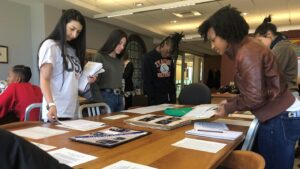Center for Research Libraries award recognizes discovery and use of new materials for research and teaching
By Shannon Sigafoos
The Queer Archives Project (QAP) at Lafayette College, a digital humanities site that documents and preserves the experiences and reflections of Lafayette’s LGBTQ+ community, has been recognized with the Center for Research Libraries (CRL) 2020 Award for Access. The national award recognizes “work promoting primary source materials … that has resulted in expanded discovery, appreciation, and usage, ultimately having a significant impact on research or instruction.”
Jointly led by The Lafayette Libraries‘ College Archives and Digital Scholarship Services and the Women’s, Gender, and Sexuality Studies program, the QAP digital humanities site interconnects the LGBTQ+ oral history project with more than 150 scanned items from the Lafayette College Archives, connecting them via relevant themes and keywords. A key goal of QAP is the promotion of Queer studies across the Lafayette curriculum.
Launched in 2019, the QAP site was the vision of Mary Armstrong, Dana Professor of WGSS and English and chair of women’s, gender and sexuailty studies, and originated with a 2013 course she taught on sexuality studies. While her original goal was to have students work with Special Collections and Archives to investigate Lafayette’s LGBTQ+ history, the project eventually grew into six years of collaborative efforts among faculty, staff, and students.

Students from Mary Armstrong’s WGS 340 class work in the College archives.
“The course I was teaching at the time was very theoretical, and we studied how institutions connect with identity. The project emerged from my interest in connecting students to Lafayette history to find concrete examples of what we were studying,” explains Armstrong. “It took many years to make the digital humanities site happen.”
Armstrong goes on to explain that she took her class to Special Collections, where students worked with college archivist Elaine Stomber, who suggested they focus on LGBTQ+-related themes. Lafayette had never intentionally collected materials specifically related to LGBTQ+ history, and Archives was eager to collaborate and change that pattern.
“I wanted them to see that working in the archives is not only about what you can ‘find.’ It’s also about the new questions that you ask because you engage with primary sources,” says Armstrong. “When you come across something new, it leads you to new research.”
Armstrong, Stomber, and then-director of special collections Diane Shaw went on to build an LGBTQ+ oral history project, conducting more than 20 interviews with LGBTQ+-identified Lafayette alumni, as well as faculty and staff. Those willing voices are what Armstrong calls QAP’s “fourth partner” and “heroes” of the project.
As the oral history project moved forward, Charlotte Nunes, director of The Lafayette Libraries digital scholarship services, arrived at the College in 2016 and immediately became a key member of the QAP team. “I had ideas for the site that were extremely complex but no appreciable skills for realizing them,” says Armstrong. “When Charlotte arrived, the site was able to take on the highly integrated and unique form it has today. The DSS team has made the site possible.” EXCEL Scholars also were involved in every phase of the digital site, helping to design the data model, adding many of the site’s archival artifacts, and working directly with oral history interviews. The QAP digital humanities site will continue to involve students as new interviews and artifacts are added.
CRL is an international consortium of university, college, and independent research libraries with over 200 members, and the prestige of the Award for Access shows in its list of past winners—many of which are major research universities. By identifying and recognizing innovative uses of primary sources, CRL seeks to support the practices and needs of the scholars, points out Anne Houston, dean of libraries. That the site makes the College’s LGBTQ+ history accessible as both teaching and research material is what earned QAP the CRL Award for Access.
As it stands, QAP serves as a piece of Lafayette history that continues to shape the future.
“The Queer Archives Project was never about just preserving the past. It’s always been about the future, especially a better future for students,” says Armstrong. “Research and teaching about the past matters because the past always shapes the future. Our hope is that others at Lafayette can teach LGBTQ+ studies and conduct research on LGBTQ+ issues more easily because of the QAP.”
